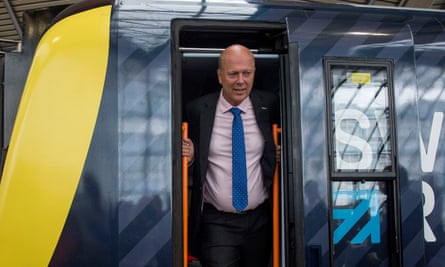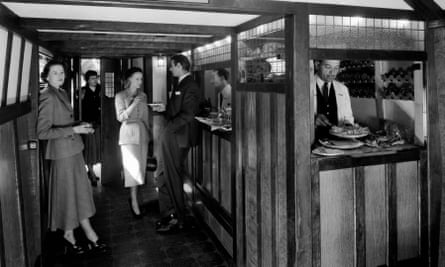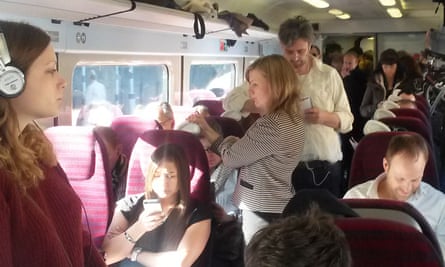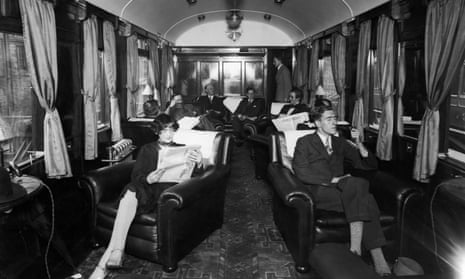Feeling flush one recent Saturday afternoon at Victoria, I asked for a first-class train ticket to Brighton. “Why?” said the ticket clerk. “There’s hardly any difference.”
It was quite an effective guilt trip – coming only a few days after the transport secretary, Chris Grayling, had suggested first class ought to be abolished to create more space on certain commuter routes. When agreeing future deals, he said, train companies would be told they “can’t start segregating”, and some reduction in first-class provision may be required of whoever wins the Southeastern franchise next year.
Grayling’s remark bothered me – it seemed I was being outflanked in egalitarianism by a Tory. But then, I have always had a neurosis about railway class, owing to my father having been a fairly senior British Rail employee. As long as I was a dependent of his, I had a privilege ticket permitting free first-class travel – and by contriving to remain in full-time education, I’m proud to say I managed to remain a dependent until I was 26.
Through much of the 1970s and 80s, I savoured first class in various reprehensible ways. Sometimes I wore a tie and a tweed jacket, affecting to be as prosperous as my travelling companions. At other times, I would go for iconoclasm: sprawling on a first-class seat in jeans and trainers, reading the NME and eating crisps, I would try to provoke pin-striped business types into saying: “Excuse me, young man. Are you aware this is a first-class carriage?”
“Yep,” I’d say, cracking open a can of beer.

These days, I am usually to be found skulking in second – exiled, as it were, from my inheritance – and feeling resentful. Unless, of course, no second class is available – as on the Underground, say, or when using Chiltern Trains, a company that has voluntarily adopted a one-class system. They have no word for this class: “It’s just who we are,” the press officer blithely told me. Apparently their customers are forever tweeting about how they thought they’d blundered into first, only to realise with delight that one size fits all.
My own Chiltern experiences have been pleasant, and I don’t hanker after a first-class seat on their trains – nor, for that matter, when flying with classless Easyjet. In fact, I positively disapprove of those who try to be fractionally one-up by paying extra for “speedy boarding”. Once, my wife purchased this for us – not out of snobbery, but because we really were in a hurry. Even so, I was mortified when, as I returned to the departure gate from the gents, she called out from the front of the queue: “Andrew, we’ve got speedy boarding! It’s fine to push in!”
The resentment of those who pay for privileged travel is greatest, as minister Grayling knows, on Britain’s railway commuter lines. The vaunted doubling of passenger numbers in the past 20 years is down to an increase in big city commuting, undertaken on crowded trains in circumstances of the utmost misery. The sight of people lounging in first is enough to bring out the Marxist in any passenger enduring the scrimmage of standard.
At less crowded times, the sight of first-class passengers might be even more provoking, because there is usually very little difference between first and second on short-hop trains, beyond the antimacassars and the colour scheme. First class usually has warmer colours compared to the default washed-out blue of standard, raising the suspicion that standard class has been deliberately uglified. (In France, the designer Christian Lacroix challenged this convention – and reputedly irritated SNCF – when his 2005 design for the refurbishment of some TGV trains involved a greyish blue for first, and warm purples and oranges for standard.)
So is Grayling, for once, striking a genuinely progressive note? In fact, it would be more accurate to say he has fallen in line with conventional wisdom about railway class. For 150 years, the trend has been towards a railway egalitarianism – which represents a long, slow correction of an early dash in the opposite direction.
Originally, Britain’s trains were the class system on wheels. There were basically three classes, and third was usually open air, which some people who could afford second or first favoured in pleasant weather, like drivers of open-topped sports cars.
In 1872, the canny Midland Railway – always looking for a customer service angle, since it had come late to the Anglo-Scottish market – abolished second, offering a more luxurious, but still cheap, third. Other companies followed suit, with the three classes tending to linger in the snobbish south, but second was mainly gone by 1930.

In 1940, when we were all supposed to be pulling together for the war effort, class distinctions were removed on trains operating within the old London Passenger Transport Area, and this enlightened, single-class regime still applies to some short London commuter lines. In the mid-1950s, first and third became first and second to make the gulf seem smaller. In 1987, second became “standard” for the same reason.
Yet despite this gradual attempt to eradicate class snobbery from British trains, it would be hypocritical of me to suggest the logical and right outcome is completely classless rolling stock.
Despite that Victoria ticket clerk’s protestation, I went ahead with my first-class purchase to Brighton, and found myself separated from some raucous women on a hen party by nothing more than a Perspex screen. It didn’t keep out the noise, but it did keep them out.
At Clapham Junction, however, another hen party got on and some of them sprawled into first, not realising. I was agonising about whether to speak up when they clocked the antimacassars and decamped into standard.
I was reminded of the time I’d been in first class travelling from York to London, when the train in front broke down. At Doncaster, a few hundred new people boarded our train, with carte blanche to take any available seat, including those in first.
The man who’d been sitting next to me since York called the guard over and said, “I assume I’ll be entitled to a full refund?” The guard asked why, and he said, “Because I’ve paid to be with first-class passengers, and all these people are standard-class ticket holders.”
The guard pointed out that he was still entitled to unlimited free coffee, which the new arrivals would not be – although this was an academic point since the water boiler had packed up. I can’t remember the upshot, but I think the complainant was onto a loser, possibly because of a legal case of 1918: Jones vs Great Northern Railway, in which the plaintiff was denied compensation for a “second class irruption”.

I suppose my neighbour at Doncaster might have paid top price for his first-class ticket, and the difference between a “walk on” first-class fare and an equivalent standard-class fare is higher in Britain than in most of Europe (it can be twice as much). But one benefit of our over-complicated ticketing system is that first class can be accessed by the back door: by the purchase of advance and off-peak tickets, or “weekend first” upgrades. All these tickets are growing increasingly popular.
Barry Doe, who writes a column about train fares for Rail magazine, says he quite often takes first class from Bournemouth to London: “And some of my fellow travellers are students. They’ve seen they can get a standard-class advance fare for £15, and first class for just a pound more.” You might call this Tory paternalism: offering people a chance to enter the privileged fold on a conditional basis.
Doe believes the solution to our over-crowding problem is longer trains, not the abolition of first. “First-class tickets are unregulated,” he says, “so if first is under-used, the company should just reduce the prices.”
To his mind, first class helps trains compete with cars: “Today, even the most bog-standard car has comfortable seats and air conditioning as standard, whereas modern trains are not much more than boxes on wheels.”
The open design of modern train carriages is another factor: whereas in the days of compartments, only six or eight people had to behave considerately for the journey to be enjoyable, now 80 people have to behave considerately – and they usually don’t.
Today, everybody on a train is trying to pretend they’re not on a train by doing their own thing, and this is usually noisy – be it sending or receiving pinging text messages, shouting into a phone, watching a film, or listening to music through leaky earphones.
It is undeniably the case, however, that there is less cacophony in first class. Yes, one may have to contend with triumphalist executives showing off about how busy they are – but the sounds of work are still, on the whole, less irritating than the sounds of leisure.
Above all, there’s a drastic shortage of glamour on British trains, which are cheaply made and – compared to those in Europe – narrow and low-bodied. And there is still a hunger for railway glamour, as suggested by the recent excitement over the announcement that the sleeping berths on the new Caledonian Sleeper carriages will have double beds and en suite bathrooms.
Dining cars used to provide a touch of romance. In 1997 there were 250 of them on British trains, and they were open to all passengers. I once heard a donnish radio discussion, hosted by Robert Robinson, about whether it was unethical to buy a second-class ticket and then spend the whole journey in the dining car, which was effectively first-class accommodation. As I recall, the conclusion was typically Robinsonian in its refinement: he absolved himself of the need to buy a first-class ticket for the dining car, the guilt caused by not having done so being sufficient penance.
The only surviving proper diners are on Great Western. The last time I was on one of their trains, the steward speaking over the tannoy offered the inducement that this was a “first-class experience”. Well, the truth is, I do need first-class experiences – ideally in first class – every so often. Because without them, I might easily forget why I ever liked trains in the first place.
- Andrew Martin’s latest novel, Soot, is available from the Guardian Bookshop at a saving of 15% on the RRP
- Follow the Guardian’s Inequality Project on Twitter here, or email us at inequality.project@theguardian.com

Comments (…)
Sign in or create your Guardian account to join the discussion